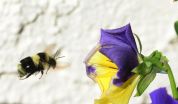(Press-News.org) Researchers have identified a protein produced by white blood cells that puts the brakes on muscle repair after injury.
By removing the protein CD163 from mice, scientists at Emory University School of Medicine could boost muscle repair and recovery of blood flow after ischemic injury (damage caused by restriction of blood flow).
The findings point to a target for potential treatments aimed at enhancing muscle regeneration. Muscle breakdown occurs in response to injury or inactivity -- during immobilization in a cast, for example -- and in several diseases such as diabetes and cancer.
The results are scheduled for publication online by Nature Communications on August 5.
CD163 was known to scientists, mostly as a molecule involved in scavenging excess hemoglobin from the body, but its role in regulating muscle repair was not, says senior author Aloke Finn, MD, assistant professor of medicine (division of cardiology) at Emory University School of Medicine.
Mice lacking CD163 showed increased blood flow and muscle repair, compared with controls, after an injury coming from a restriction of blood flow in one leg. Examining the mice lacking CD163, Finn and his colleagues were surprised to find that blood vessels and muscle fibers also grew substantially (roughly 10 percent) in their uninjured legs.
"We were astonished," Finn says. "Why would something we did, which caused an injury to one leg, help tissue in the other leg regenerate when it wasn't injured in the first place?"
Potentially, researchers could try to achieve the effect of removing CD163 in humans by giving patients an antibody against CD163, but more research is needed to know how this might work. CD163 levels have been found to increase in aging humans in multiple studies.
Finn and his colleagues found that macrophages, which are a type of white blood cell, appear to release a soluble form of CD163 in response to injury. In the blood, CD163 soaks up and counteracts another protein called TWEAK, which stimulates muscle cells to multiply.
In CD163's absence, TWEAK can have a greater effect, and can apparently stimulate muscle growth distant from the site of injury. When infused into normal mice, TWEAK does not have any effect on muscle growth, possibly because of circulating CD163.
Scientists that study muscle cells have been interested in TWEAK for several years, but some studies have suggested that TWEAK negatively regulates muscle regeneration - the opposite of what Finn's team observed. To prove that TWEAK was needed for the extra repair seen in mice lacking CD163, the Emory researchers showed that if they injected an antibody against TWEAK, thus removing it from the blood, it eliminated the extra repair activity.
"I think our results show a specific mechanism by which muscle regeneration takes place. TWEAK can be a pro-regenerative factor," Finn says, "but its effects have to be transient and limited."
TWEAK is thought of as transmitting inflammatory signals because it activates a master regulator of inflammation called NF-kB. While chronic inflammation is bad for muscle growth, in the mice lacking CD163, the signals coming from increased TWEAK are helpful for regeneration.
"Ischemic injury is a situation in which TWEAK can stimulate muscle progenitor cells to proliferate," Finn says. "But if you have lots of TWEAK around all the time, the muscle cells don't know when it's time to differentiate and mature. "
TWEAK has also been shown to be connected to liver regeneration and stroke. Finn says his team is currently investigating CD163's effects on atherosclerosis.
INFORMATION:
The first author of the paper is postdoctoral fellow Hirokuni Akahori, PhD.
This news release is available in Portuguese and Spanish.
A recently published special issue of the Journal of Heredity focuses on case studies of real-world applications of conservation genetics in Latin America, from nabbing parrot smugglers to exposing fraudulent fish sales.
The discipline of conservation genetics - the use of genetic techniques to further goals of conserving and restoring biodiversity - has been growing for at least four decades. But only relatively recently have genetic techniques been used not just to understand conservation problems, ...
CLEVELAND, Ohio (August 5, 2015) -- Women may now have yet another reason to quit smoking given the results of a new study that is being reported online today in Menopause, the journal of The North American Menopause Society (NAMS). The Swedish study involving 25,474 women is the first to quantify the combined effects of smoking and age at menopause on overall mortality in terms of survival time by investigating the role of smoking as a possible effect modifier.
A harmful association between younger age at menopause and overall mortality has already been documented. In ...
A new review highlights how an integrated pest management approach that utilizes a combination of chemical and nonchemical control options is the best strategy for getting rid of bed bug infestations; however, pest management professionals that are hired on a lowest bid basis are not likely to use such an approach.
Efforts in multi-family settings are especially dependent on a collaborative community or building-wide effort involving residents, building staff, and pest control technicians.
The review notes that to prevent reinfestation and reduce costs associated ...
Music is currently played in approximately 50% to 70% of surgical operations performed worldwide. In a new study of 20 operations conducted in the UK, repeated requests--for example, for a surgical instrument--were 5 times more likely to occur in surgeries with music than in those without.
The findings suggest that music during surgery can lead to increased tensions due to frustration at ineffective communication. In addition, patient safety could potentially be affected due to miscommunication.
"Our study shows that playing music in the operating theatre can run counter ...
SALT LAKE CITY - The BIG LoVE (Utah Better Identification of Germs-Longitudinal Viral Epidemiology) study, led by scientists at the University of Utah School of Medicine, finds that each bundle of joy puts the entire household at increased risk for infection with viruses that cause colds, flu, and other respiratory illnesses.
People living in childless households were infected with viruses on average 3-4 weeks during the year. In households with one child, that number jumped to 18 weeks, and for those with six children, there was virus in the household for up to 45 weeks ...
The UK government's current alcohol guidelines are unrealistic and largely ignored because they have little relevance to people's drinking habits, according to a new report by the Sheffield Alcohol Research Group (SARG) in collaboration with the University of Stirling.
The study, the first of its kind, explored how drinkers make sense of the current UK drinking guidelines which suggest men should not regularly exceed 3-4 units of alcohol per day, and women, 2-3 units daily.
Leading researchers from the UK Centre for Tobacco and Alcohol Studies conducted focus groups ...
Researchers from the University of Surrey and Lund University (Sweden) investigated how frequent, long-distance travel is represented in mass and social media. They found that the images portrayed do not take into account the damaging side effects of frequent travel such as jet-lag, deep vein thrombosis, radiation exposure, stress, loneliness and distance from community and family networks.
Instead, the study found that those with 'hypermobile' lifestyles were often seen as having a higher social status. By assessing how first-class flights, 'must-see' destinations and ...
Many mammals, including seals and rats, rely on their whiskers to sense their way through dark environments. Inspired by these animals, scientists working at the University of Illinois at Urbana-Champaign and Illinois' Advanced Digital Sciences Centre in Singapore have developed a robotic 'whisker' tactile sensor array designed to produce tomographic images by measuring fluid flow.
The results are published today (Wednesday 05 August) in the journal Bioinspiration and Biomimetics.
"When it is dark, whiskers play a key role for animals in exploring, hunting or even just ...
Cancer survival in England remains lower than countries with similar healthcare systems, according to a new Cancer Research UK funded study published in the British Journal of Cancer today.
Cancer survival in England has steadily improved but the gap in survival remains.
The research, from the London School of Hygiene & Tropical Medicine, compared survival for colon, breast, lung, ovarian, rectal and stomach cancers in England, Australia, Canada, Denmark, Norway and Sweden between 1995 and 2009, and survival trends in England up to 2012*. It included more than 1.9 million ...
RIVERSIDE, Calif. - Despite their beauty, flowers can pose a grave danger to bees by providing a platform of parasites to visiting bees, a team of researchers has determined.
"Flowers are hotspots for parasite spread between and within pollinator populations," said Peter Graystock, a postdoctoral researcher in the Department of Entomology at the University of California, Riverside and a member of the research team. "Both the flower and bee species play a role in how likely parasite dispersal will occur."
The study, published online in the Proceedings of the Royal Society ...



